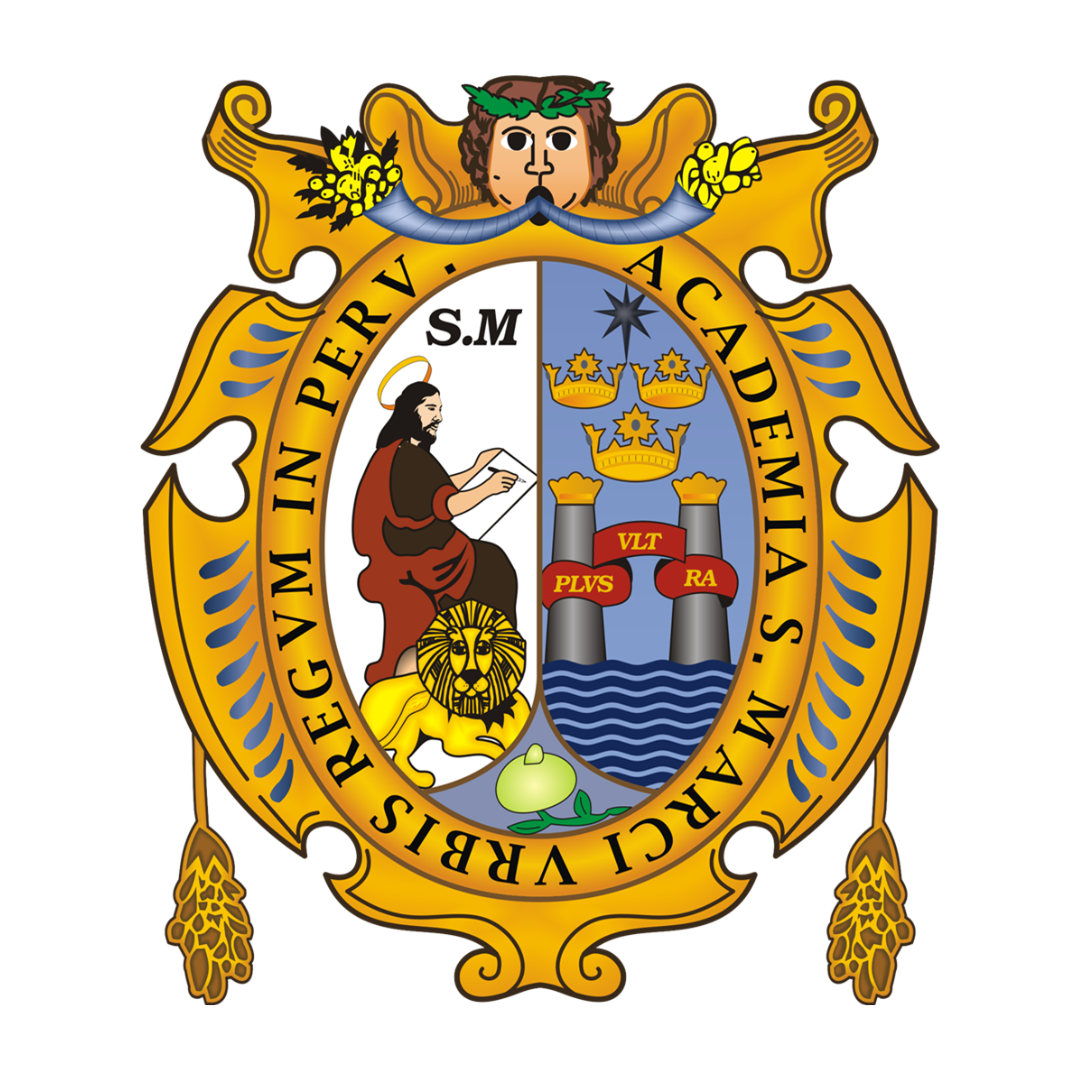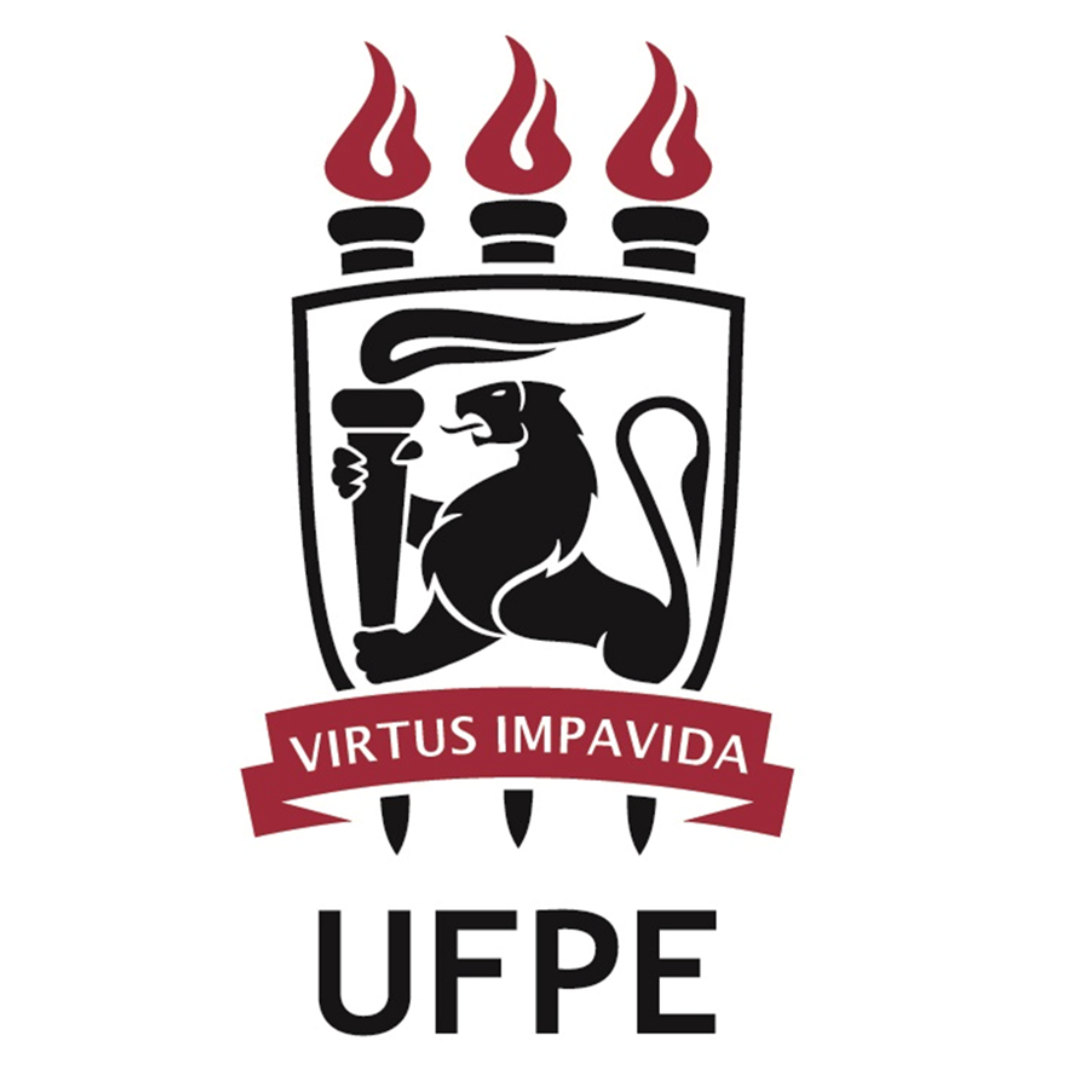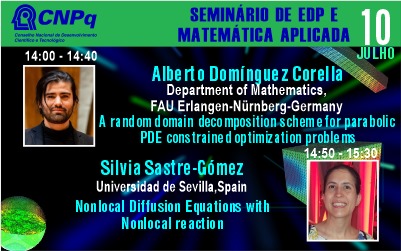Seminar in EDP and Applied Mathematics
July 10, 2024 – 14h (Brazil)
Streaming: Youtube Channel | SEMINARIO DE EDP E MATEMATICA APLICADA
Event

About Seminars
Our Online Seminar is one of the most important events in Brazil, it has been held since August 2020, every Wednesday at 2 pm, Brasília time, with a frequency of 14 days. Two 40-minute lectures are presented in each session. Our speakers are world-renowned mathematicians from Europe, the United States and South America.
Featured Talks & Speakers

Alberto Domínguez Corella
Department of Mathematics, FAU Erlangen-Nürnberg-Germany
14:00h – 14:40h
A randon domain decomposition scheme for parabolic PDE constrained optimization problems
Probability theory has had a significant impact on various areas of mathematics, particularly in algorithms and
combinatorics. The use of randomness in algorithms dates back to the Monte Carlo methods [6, 7]. In subsequent
years, random algorithms gained strength in optimization, notably with the emergence of techniques such as
simulated annealing [5] and genetic algorithms [4], which were used in complex optimization problems. In
recent years, stochastic gradient descent has attracted attention in machine learning and artificial intelligence; its
development has been crucial in training large-scale models, specially machine learning algorithms, see [1, 2].
In this talk, we discuss a random domain decomposition scheme for parabolic optimal control problems,
inspired by mini-batch algorithms used in machine learning. This scheme is based on the papers [3, 8] The method
discretizes the parabolic equation using the explicit Euler scheme and replaces the full elliptic operator with a
randomly selected elliptic operator acting on a part of the domain at each step. This approach aims to reduce
computational time. We will demonstrate the convergence of the scheme, highlighting the trade-off between speed
and accuracy. Special attention is paid to optimal control problems with bang-bang minimizers.
Acknowledgements
The author has been funded by means of an Alexander von Humboldt scholarship.
References
[1] Léon Bottou. Large-scale machine learning with stochastic gradient descent. In Proceedings of COMPSTAT’2010, pages 177–186.
Physica-Verlag/Springer, Heidelberg, 2010.
[2] Léon Bottou, Frank E. Curtis, and Jorge Nocedal. Optimization methods for large-scale machine learning. SIAM Rev., 60(2):223–311,
2018. doi:10.1137/16M1080173.
[3] Monika Eisenmann and Tony Stillfjord. A randomized operator splitting scheme inspired by stochastic optimization methods. arXiv
preprint arXiv:2210.05375, 2022.
[4] John H. Holland. Adaptation in natural and artificial systems. University of Michigan Press, Ann Arbor, MI, 1975. An introductory
analysis with applications to biology, control, and artificial intelligence.
[5] S. Kirkpatrick, C. D. Gelatt, and M. P. Vecchi. Optimization by simulated annealing. Science, 220(4598):671–680, 1983.
URL: https://www.science.org/doi/abs/10.1126/science.220.4598.671, arXiv:https://www.science.org/doi/pdf/
10.1126/science.220.4598.671, doi:10.1126/science.220.4598.671.
[6] N. Metropolis, A.W. Rosenbluth, M.N. Rosenbluth, A.H. Teller, and E. Teller. Equation of state calculations by fast computing machines.
The Journal of Chemical Physics, 21(6):1087–1092, 1953.
[7] Nicholas Metropolis and S. Ulam. The Monte Carlo method. J. Amer. Statist. Assoc., 44:335–341, 1949. URL: http://links.jstor.
org/sici?sici=0162-1459(194909)44:247<335:TMCM>2.0.CO;2-3&origin=MSN.
[8] D. W. M. Veldman and E. Zuazua. A framework for randomized time-splitting in linear-quadratic optimal control. Numer. Math.,
151(2):495–549, 2022. doi:10.1007/s00211-022-01290-3.

Silvia Sastre-Gómez
Universidad de Sevilla,Spain
14:50h – 15:30h
Nonlocal Diffusion Equations with Nonlocal reaction.
In this talk we are interested in a nonlocal diffusion equation with a nonlocal reaction
term, which is a nonlinear function g of the mean value of the solution u in a ball centered in x with radius delta. We study the existence and uniqueness of solution of the equation. We give some comparison results under hypotheses on the nonlinear term and the kernel of the nonlocal diffusion operator. Finally we give some asymptotic estimates of the solution of the equation with nonlinear term g globally Lipschitz. We prove the existence of two extremal equilibria and finally we prove that the semigroup is asymptotically smooth, and with this property, we obtain the existence of a global attractor.
About Organization
Juan Limaco -UFF-Coordenador
Mauro Rincon – UFRJ – Brazil
Anna Doubova-U.Sevilla-Spain
Luz de Teresa-UNAM Mexico
Diego Souza – U Sevilla -Spain
Felipe Chaves-UFPB-Brazil
Roberto Capistrano – UFPE Brazil
Sandra Malta – LNCC – Brazil
Marcelo Cavalcanti – UEM – Brazil;
Rui Almeida – UBI – Portugal
Roxana Lopez – UNMSM – Peru;
Mauricio Sepulveda – UdeC -Chile;
Our Partners








Access our channel!
A channel for students, professors, researchers and professionals who wish to deepen their knowledge in EDP and applied mathematics.

